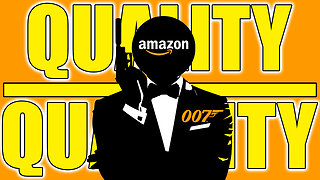Premium Only Content

When "It's the End of the Matter" Becomes the Beginning of Something Bigger.
SOURCED FROM -
When "It's the End of the Matter" Becomes the Beginning of Something Bigger.
https://x.com/KingArthurII2/status/1846993042969862633
In the heat of a disagreement, there's often a moment when someone decisively declares, “It’s the end of the matter.” It’s a definitive statement meant to close the door on further discussion, an attempt to seal the conversation. But more often than not, this proclamation marks the start of something much bigger. It signals not the end of an exchange but rather the catalyst for its continuation—fueling the very dialogue it was meant to conclude.
There’s something about the human need to have the last word. We’ve all seen it happen. It might be in the midst of a debate, a social media back-and-forth, or even within the personal dynamics of family and friends. The declaration of finality usually ignites more passion in the opposing party. Instead of diffusing tension, it creates the feeling that something essential has been left unsaid, or that the declaration itself needs to be challenged.
In many ways, saying "it's the end of the matter" is less about ending the conversation and more about attempting to assert dominance over it. It’s a way of putting one's foot down, of controlling the narrative. But that desire for control is also what keeps the exchange alive. The other person often feels compelled to respond, not because they think there's more to discuss, but because that final word wasn’t theirs.
It’s fascinating how the desire for resolution can have the opposite effect. By trying to conclude the conversation, we reopen it. This is because conversations aren't purely rational exchanges of ideas. They're emotional, driven by pride, insecurity, or the desire for validation. When one person decides it's over, the other is more likely to feel unheard, misunderstood, or simply unsatisfied. And so, the "end" becomes just another phase in a larger, ongoing dialogue.
This phenomenon plays out constantly in public life. Political debates, social movements, or even online arguments rarely die at the moment someone declares them over. In fact, those declarations often provoke a surge of activity—more responses, more engagement, and ultimately, a longer life for the discussion.
So why do we do it? Why do we feel the need to say it’s the end, knowing deep down it’s rarely ever the case? Perhaps it’s because we’re wired to seek closure, even when it’s elusive. Or maybe it’s because, in trying to close a chapter, we inadvertently write the next one.
The next time you hear someone say, "It’s the end of the matter," remember: It’s likely just the beginning of something bigger. The more definitive the statement, the more likely it is to inspire a retort, an extension of the dialogue it sought to end. After all, conversations—especially those heated by emotion—have a life of their own, far beyond our attempts to cut them short.
In the end (if there ever is one), we must accept that dialogue is a living thing, and the desire for the last word only gives it more breath.
-
 1:36:21
1:36:21
Sarah Westall
11 hours agoViolence Erupting in the Panama Canal, Identifying Enemy Infiltration, Psyops Ongoing w/ Michael Yon
83K46 -
 1:56:25
1:56:25
Nerdrotic
13 hours ago $17.86 earnedThe Red Pyramid's Hidden Secrets | Forbidden Frontier #091
64K14 -
 2:08:53
2:08:53
vivafrei
22 hours agoEp. 252: Liberals DISQUALIFY Candidate from Race! DOGE Wins & Loses; Rumble Sues BRAZIL! & MORE!
153K260 -
 1:15:12
1:15:12
Josh Pate's College Football Show
12 hours ago $22.65 earnedCFB’s Top 12 Programs | TV Executives & Our Sport | USC Changes Coming | Early Championship Picks
97.8K3 -
 LIVE
LIVE
Vigilant News Network
16 hours agoUK Government BUSTED in Secret Plot to Extract Your Data | Media Blackout
1,535 watching -
 1:03:32
1:03:32
Winston Marshall
3 days ago"War On Children!" The DEMISE Of The West Starts With Schools - Katharine Birbalsingh
127K68 -
 48:02
48:02
Survive History
19 hours ago $9.24 earnedCould You Survive as a Sharpshooter in the Napoleonic Wars?
77.1K3 -
 12:03
12:03
Space Ice
20 hours agoSteven Seagal's China Salesman - Mike Tyson Knocks Him Out - Worst Movie Ever
57.3K21 -
 11:37
11:37
Degenerate Jay
19 hours ago $20.69 earnedJames Bond Needs Quality Over Quantity From Amazon
131K13 -
 15:23
15:23
Misha Petrov
20 hours agoTrad Wives & Girl Bosses Go to WAR!
93.5K55